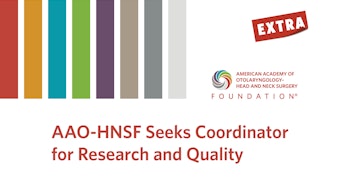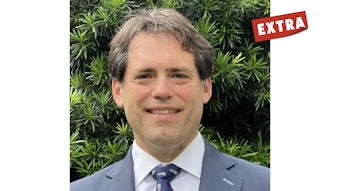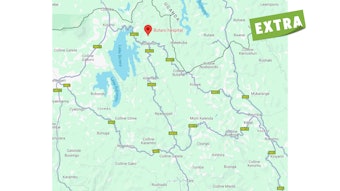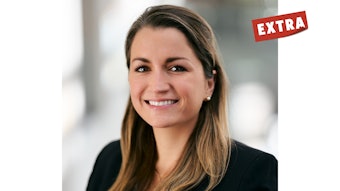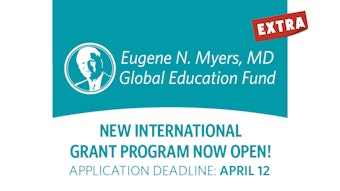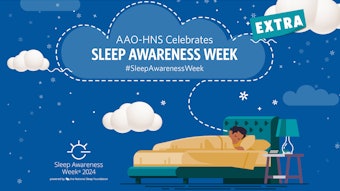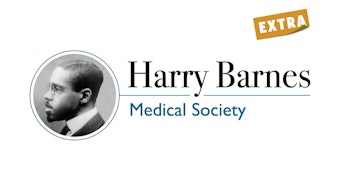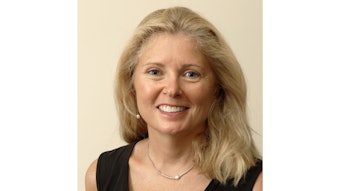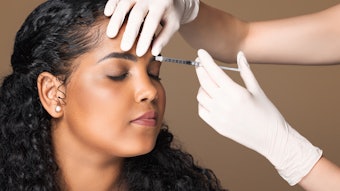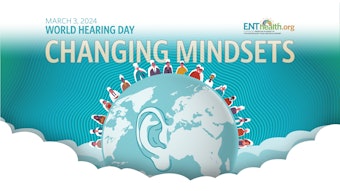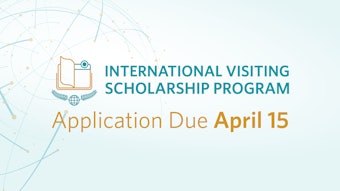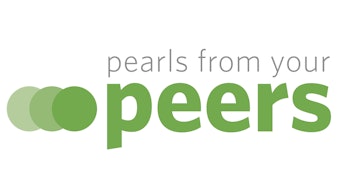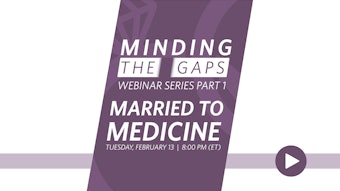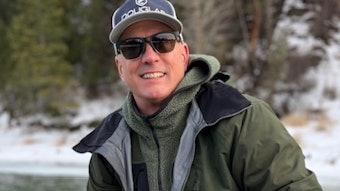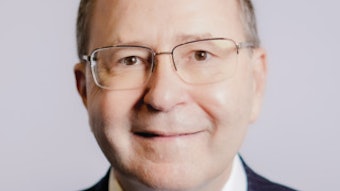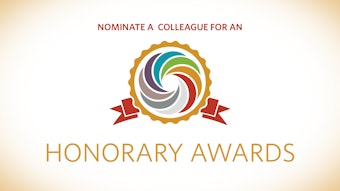Partnering for Positive Change in Underserved Countries: An Interview with Gregory J. Basura, MD, PhD
Long-term educational partnerships focused on teaching and capacity-building can empower the next generation of local healthcare providers to create lasting, meaningful change.
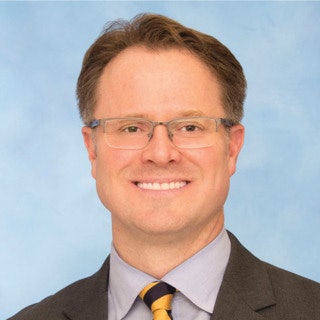 Gregory J. Basura, MD, PhD
Gregory J. Basura, MD, PhD
After joining the University of Michigan faculty in 2012, Dr. Basura started making humanitarian trips to Africa, first with a private, service-based relief program. “That first experience taught me a lot about the capacity of outreach. It’s wonderful to provide service and help individuals, but the adage of teaching someone to fish versus simply giving them a fish should be considered,” he said. “Establishing long-term medical-educational partnerships where you learn from each other over the long haul is critical.”
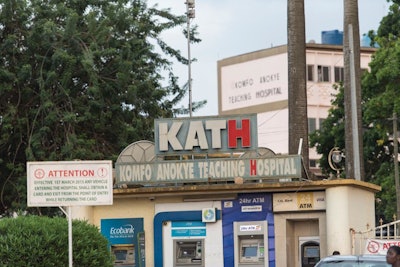 Komfo Anokye Teaching Hospital (KATH) in Kumasi, Ghana. Reproduced with permission from Michigan Medical.
Komfo Anokye Teaching Hospital (KATH) in Kumasi, Ghana. Reproduced with permission from Michigan Medical.
“The timing couldn’t have been better because that was the kind of work I wanted to get involved in,” he said. “I went to Ghana six times over a three-year span, twice a year for a week at a time. We initially established and outfitted a two-station temporal bone dissection lab for their two attendings to expand their skill sets and to teach their residents.”
They brought microscopes and micro-instruments to perform ear surgery, and established epidemiology research and education. In peri-urban Kumasi, they initiated hearing screenings at community homes to measure and treat pediatric hearing loss.
“But I began to realize that going out one week at a time twice a year just wasn’t enough to build sufficient capacity to teach the local providers there at the level they needed to elevate their medical knowledge and advance their medical and surgical practice skills,” said Dr. Basura.
Launching an Otology Fellowship in Africa
“Here in the U.S., we complete our education and residences, then many go on to complete sub-specialized fellowship training, and we have these dedicated blocks of time devoted to acquiring ENT skills. For me, this reinforced the idea that the same fellowship training opportunity in otology is needed on the African continent.” The key was to find a location and educational partner organization with significant infrastructure and trained personnel to help.
Dr. Basura reached out to Professor Johan Fagan, MBChB, FCS (ORL), MMed, Leon Goldman Professor and Chair of the Division of Otolaryngology at the University of Cape Town (UCT), South Africa. Dr. Fagan has a special interest in advancing head and neck surgery in Africa and the developing world, and he started the first head and neck cancer surgical fellowship in Africa nearly 20 years ago. That program takes one African fellow annually who trains for a year in Cape Town before returning to their home country.
As it turned out, Dr. Fagan and Tashneem Harris, MBChB, FCORL(SA), were already developing an otology fellowship at UCT. In March 2022, with sponsorship from a cochlear implant company, MED-EL, the first dedicated otologic surgical training fellowship began under the direction of Dr. Harris.
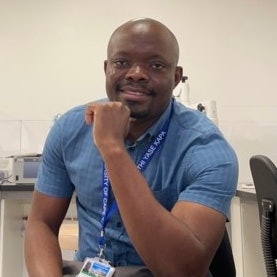 Erasmus Muganda, MBChB, FCORL(SA), from Muganda, Zimbabwe. The first otology fellow in Africa.
Erasmus Muganda, MBChB, FCORL(SA), from Muganda, Zimbabwe. The first otology fellow in Africa.
During his fellowship, Dr. Muganda performed a broad range of surgeries, including tympanoplasty, stapedectomy, ossicular chain reconstruction, canal wall up and down tympanomastoidectomy, and placement of cochlear implants. He also practiced otological surgical skills in the temporal bone dissection lab with Dr. Basura and participated in weekly virtual lectures and case discussions on otology/neurotology, audiology, and vestibular medicine with invited colleagues through the University of Michigan.
Today, Dr. Basura continues his twice-a-year visits to the fellowship program in Cape Town as well as his weekly Zoom lectures on Friday mornings. The second program fellow from Ghana started in March 2023 and will be graduating as the next fellow, from Kenya, prepares to start her year of training. The next few years of fellows have also already been selected.
Building a Sustainable Community: the African Otological Society
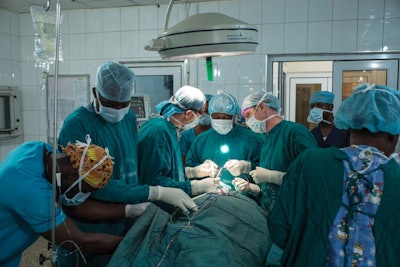 Surgery conducted during a visit of University of Michigan otolaryngologists to Ghana. Reproduced with permission from Michigan Medical.
Surgery conducted during a visit of University of Michigan otolaryngologists to Ghana. Reproduced with permission from Michigan Medical.
Dr. Basura conducted an initial virtual meeting of the African Otological Society last November to discuss topics such as the short-, mid-, and long-range goals of the society, plans for monthly meetings and content, medical-educational platform building, links to temporal bone courses, equipment donation, website development, rosters for contacts, fundraising, and more. A follow-up meeting was held in January with more planned on a monthly basis.
“The goals for the Society include initiating communication, making connections, sharing resources, and highlighting opportunities. I’m there to help guide and facilitate, but we really need African leadership to empower and build a community that they run. I really want it to be about Africa, by Africans, to establish, promote, and standardize otology training, ear surgery, and ear care across Africa.”
Opportunities for AAO-HNS Members to Get Involved
According to Dr. Basura, some of the most common hearing-related conditions that he sees in his travels include chronic ear disease, cholesteatomas that have become infected, eardrum perforations, chronic otitis media, conductive and sensorineural hearing loss, noise exposure, trauma, and opportunities for rehabilitation including, ideally, cochlear implantation.
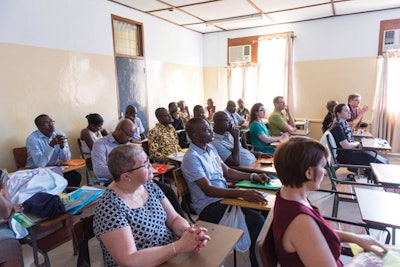 A study session during a visit of University of Michigan otolaryngologists to Ghana. Reproduced with permission from Michigan Medical.
A study session during a visit of University of Michigan otolaryngologists to Ghana. Reproduced with permission from Michigan Medical.
The Eugene N. Myers, MD Global Education Fund
Many physicians working in low-resourced countries encounter enormous challenges, including limited or no access to specialized training institutions and constrained access to medical supplies and equipment. For many of these physicians, traveling to attend a meeting or paying for online education without financial assistance is not an option. The Academy created the Eugene N. Myers, MD Global Education Fund to honor Dr. Myers’ dedication to advancing otolaryngology and patient care worldwide to benefit the continuing education needs of otolaryngologists practicing in low-income countries.
Eugene N. Myers, MD, Past President of the AAO-HNS/F and the first AAO-HNSF International Coordinator, has worked tirelessly throughout his career to provide aid and assistance to physicians, especially in resource-challenged countries. Focused on improving otolaryngology-head and neck surgery throughout the world, Dr. Myers has travelled to over 100 countries, speaking at conferences, lecturing at medical schools, and serving on boards of international societies. He has educated and mentored numerous ORL-HNS department chairs and chiefs around the globe and is the founder of the AAO-HNSF International Affairs Program, which launched in 1996.
“I think it’s an incredible fund, and I’m so glad that it’s named after Dr. Myers, whose dedication and international work over the years are just incredible,” said Dr. Basura. “I hope the fund continues to have a strong presence at the Annual Meeting so members are reminded how much we could and should be doing for our colleagues and, ultimately, their patients in low- and middle-income countries.”
Sustaining Lasting Change Through Education
To expand and sustain medical-educational partnerships and outreach, AAO-HNSF provides humanitarian travel grants to residents and trainees to engage in an outreach experience.
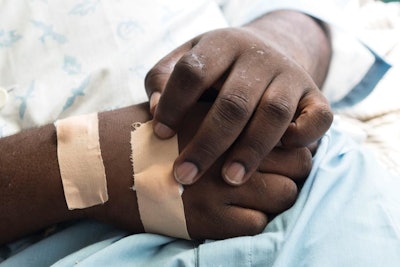 A patient treated during a visit of University of Michigan otolaryngologists to Ghana. Reproduced with permission from Michigan Medical.
A patient treated during a visit of University of Michigan otolaryngologists to Ghana. Reproduced with permission from Michigan Medical.
